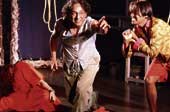 |
| Tritiya Sutra and Chetana stage Kangal Malsat. Picture by Aranya Sen |
Counter-culture is alive and kicking in Calcutta. Theatre is at its most pungently potent when it launches guerrilla attacks on the establishment, and that is exactly what Tritiya Sutra and Chetana have done with Suman Mukhopadhyay?s dramatisation of Nabarun Bhattacharya?s Kangal Malsat, premiered at Padatik Little Theatre last Friday. Catch it before the moral (and immoral) police crack down because, to take the kicking metaphor further, it is a flying kick aimed at the government?s solar plexus.
Bhattacharya?s riotously anarchic novel has become a campus cult classic since publication just a few years ago. The reasons are pretty obvious. It dissects almost everything wrong in the city with a satirist?s knife whetted on trenchant farce and fantasy.
There is hardly anything by way of a story, but what little there is involves two groups of rebels, the lowly Choktars and the aerial Phatarus, mobilised by the quack occultist Bhodi Sarkar against the Paschim Banga Sarkar, and advised by Calcutta?s progenitors in the shape of an ancestral crow and an Indo-colonial half-breed named Begum Johnson. In the melee that erupts, the Choktars unearth cannons underground, the Phatarus bomb Writers? and Lalbazar with brickbats, and the poor cops have no answer to the assault that many proud but frustrated Calcuttans have felt like leading at some time in their lives, and that reflects the seething rage barely underlying the chaotic calm.
Mukhopadhyay pictures this vividly and hilariously. The flying Phatarus fascinate by the simplicity of their airborne sorties, and Dandabayas the crow stalks on stilts. Skeletons dance in crematoria, resident ghosts gossip and prattle, and the police officers in charge of Keoratala and Siriti trade charges that errant skulls have come from the other burning ghat. Stalin talks down from his portrait on the wall to a stunned disciple, and Minister Acharya storms about ordering everyone ?Do it now!? Despite the fun, we recommend that you leave the kids to study when you go to this play, unless you want to enrich their vocabulary with colourfully scurrilous and scatological Bengali.
A lot of effort has gone into training the cast. Of course, Supriyo Dutta is one of our best actors, and as Bhodi he gives another outstanding performance of the low life. But Runa Bandopadhyay actually creates a more diverse character as his partner ? nagging yet affectionate, a caricature yet also possessed when entering a trance.
Samrat Chakraborty?s eerie music complements the tone. However, the second half is less successful as we find Mukhopadhyay repeating techniques, the infectious humour falling more flat, and concluding abruptly as the two parties negotiate in gibberish that sounds simply too nonsensical. He could have inserted Bhattacharya?s onslaught on Bengali media moguls instead, for greater variety.
As for the politics, Mukhopadhyay says in his brief directorial note that he ?tried to maintain the agitational-propagandist spirit?, but Kangal Malsat really has no trace of agitprop. In fact, he carefully avoids any explicit expression of Bhattacharya?s known ultra-left ideology, which could have put audiences off at a time when Maoist extremism claims innocent victims closer to Calcutta by the day. One wonders, though, what Bhattacharya makes of the irony that this production received financial assistance from the department of culture, Government of India.











